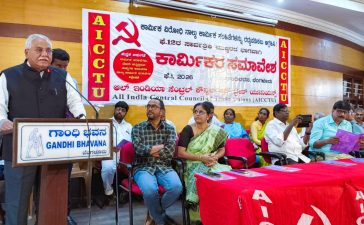Syed Sha Ali Ul Hussaini Takes Helm as Waqf Board Chairman with a Vision for Community Empowerment
Bengaluru: In a significant development, Syed Sha Ali Ul Hussaini has been elected as the new Chairman of the Karnataka State Waqf Board, bringing with him a promise of progress and inclusivity. Addressing the media after his election, Hussaini passionately emphasized his dedication to upholding the law and the Waqf Act, while outlining an inspiring vision for the future. He pledged to harness the potential of waqf properties to uplift the Muslim community, particularly its most marginalized members.
A Vision for Empowerment and Self-Reliance
“I am committed to empowering our community by equipping individuals with the skills and resources they need to achieve self-reliance and prosperity,” Hussaini declared. His vision centers on leveraging waqf assets to combat poverty and create sustainable opportunities for growth and development.
Gratitude to Supporters and Leaders
Hussaini extended heartfelt gratitude to Congress President Mallikarjun Kharge and Karnataka Chief Minister Siddaramaiah for their unwavering support during his election. He acknowledged their pivotal roles in his appointment and reaffirmed his resolve to serve the community with integrity and dedication.
Controversy and Delays in the Election Process
The road to this election, however, was not without its challenges. Initially scheduled for February 17, 2025, the election faced delays due to considerable opposition. Concerns were raised over allegations that Minority Affairs Minister Zameer Ahmed Khan sought to appoint Anwar Basha as Chairman, despite claims of his involvement in waqf land encroachments. Additionally, reports surfaced that several nominated board members were under scrutiny for criminal charges.
Calls for Transparency and Merit-Based Appointments
Activist Syed Ashraf had called on the Chief Minister to ensure that individuals with questionable backgrounds were excluded from the Waqf Board, stressing the importance of transparency and merit in the selection process. Ashraf also accused Minister Zameer Ahmed Khan of favoring close associates for key positions within the Minority Affairs Department, including the Waqf Board, which operates independently. He argued that such practices undermined constitutional values and sidelined merit-based appointments.
A Triumph for Justice and Fairness
Following the postponement of the election, Ashraf hailed Chief Minister Siddaramaiah’s decision as a triumph for justice and fairness. The rescheduled election saw former Karnataka Waqf Board Chairman Anwar Basha and several board members boycott the meeting. Despite their absence, Hussaini was elected with the support of the five members present.
Commitment to Unity and Collaboration
When questioned about the boycott, Hussaini struck a conciliatory tone, emphasizing his commitment to unity and collaboration. “I am determined to work inclusively, bringing everyone together for the betterment of our community, regardless of their initial stance,” he said. He expressed optimism that those who abstained from the election would eventually join hands in supporting his leadership.
A New Era of Community Development
Hussaini’s tenure is poised to usher in a new era of community development and efficient management of waqf properties. His focus on long-term sustainability and empowerment promises to create a brighter future for Karnataka’s Muslim community, fostering hope and progress for generations to come.
![]()












Наслаждайтесь увлекательными играми и щедрыми бонусами в [url=luckypari-topcasino.ru]LuckyPari скачать[/url]!
LuckyPari — это уникальная платформа, которая предоставляет пользователям широкий спектр услуг. На сайте представлено множество спортивных событий, на которые можно делать ставки. Это делает процесс ставок более комфортным для пользователей. которые могут столкнуться с различными вопросами. Такой многообразный подход к поддержке клиентов повышает уровень удовлетворенности.
Try your luck and win big with[url=https://surewin-online.com/]surewin app[/url].
Gamers enjoy the smooth operation whether they play on desktop or mobile.
Сегодня дистанционное подготовка школьников становится всё более эффективным.
Может пригодиться; https://grace-calipso.ru/
Discover the excitement and win big with exclusive bonuses at [url=https://fairspin-casino.com/]fairspin promo code[/url].
This mechanism builds confidence and enhances the overall user experience by eliminating doubts about rigged outcomes.